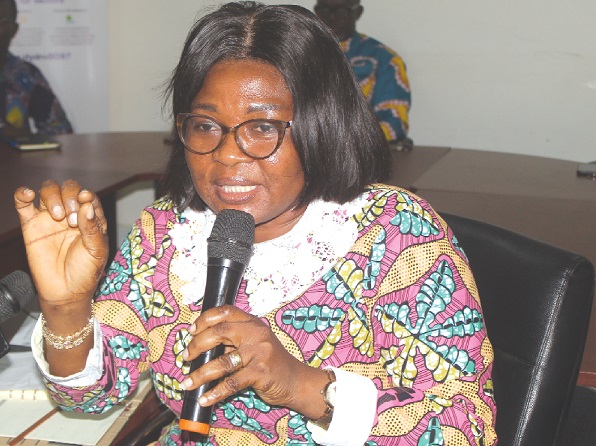
GMet releases 2023 rainfall forecast - Warns of flash floods
The Ghana Meteorological Agency (GMet) has indicated that flash floods may occur during the peak of the 2023 rainfall season, especially in low lying areas and places along watercourses in the country.
The major rainfall season for the south of the country is usually in March, April, May and June.
Flash floods occur when a lot of storm water fills, normally, dry areas within a short time, with little or no warning after very heavy rainfall during short intense storms. They can occur within a few minutes or few hours of rainfall.
The meteorological agency made this known in Accra yesterday during the presentation of the 2023 seasonal rainfall forecast of the country.
The presentation was part of activities to mark the month-long National Metrological Awareness month slated for March 1 to 31, this year on the theme: "The feature of weather, climate and water across generations."
Normal rainfall or below
The Deputy Director in charge of Research and Applied Meteorology at GMet, Francisca Martey, who presented the forecast, said the 2023 rainfall season would experience a normal to below normal rainfall for both March to May and April-May-June across the country.
However, she said, some areas in the middle portions to the transitional areas of the country would experience below normal rainfall tendency for both the March to May and April to June seasons.
Floods
"At the peak of the season, there is a high probability of heavy rains accompanied by strong winds and lightning which could lead to flooding and damage to structures," Mrs Martey said.
She said the country was highly likely to experience relatively short to normal dry spells at the beginning and towards the end of the rainy season.
Mrs Martey stated that places along the coast and some inland areas were likely to have some surplus rainfall in the months of May and June, while the western parts of the country would experience some deficit rainfall amounts for the March-May and April-June seasons.
She therefore, urged the public to monitor the daily weather forecast before stepping out of their homes.
Mrs Martey also called for the establishment and the operationalisation of integrated monitoring and early warning systems for flood risk for those occupying spaces in flood-prone areas.
Also, GMet suggested the sensitisation of the populace in the exposed area about impending danger while settlers in endemic flood-prone areas should be relocated.
To metropolitan, municipal and district authorities and the National Disaster Management Organisation (NADMO), Mrs Martey asked them to put in place the necessary measures to ensure that communities and livelihoods were safeguarded.
"Authorities should provide emergency or temporary sites for the victims and assist the homeless and vulnerable groups in society during the period,” she said.
“They should also ensure the control and maintenance of dams and irrigation infrastructure, while households and industries were encouraged to harvest runoff water," she said.
Ms Martey urged motorists to be mindful of fallen trees and objects on roads during or after a storm.
The Research and Applied Meteorology Director advised that the public also monitor water quality and report any suspicions to environmental offices of the local assemblies.
In the event of an approaching storm or strong winds, Mrs Martey advised the public to move to safer places, while people staying in flood-prone areas should move to higher grounds.
As a result of the high levels of risk of diseases such as cholera, malaria, dengue fever, bilharzia and diarrhoea and other water and air-borne diseases, she called for intensified public education on vaccination and to stock up mosquito-proof nets, anti-malaria drugs, chlorine and other water treatment products.
In the agricultural sector, the director of meteorology stated that for the areas likely to observe surplus rainfall, early season start dates, shorter dry spells and excess floods should increase vigilance against crop pests while areas likely to experience water deficits should focus on drought tolerant species.
GMet also urged farmers in such areas to adopt farming techniques for the conservation of soil water and liaise with national meteorological, agricultural and hydrological experts for information and advice.
Mrs Martey also urged the power companies to switch off power in case of heavy rains accompanied by strong winds and lighting that could lead to flooding to avoid electrocutions.
For those who are at risk of drought due to prolonged dryness which was likely to occur in some places in the south-western parts of Ghana during March to May and April to June, “they are to adhere to prudent use of available water and storage of water whenever it rained.”
Mrs Martey also called for the stepping up of education and sensitisation of people to the likelihood of bushfires while the public desilt drains in front of their homes and shops before the rains set in.
Climate change
The Director-General of GMet, Eric Esuman, said climate change was impacting not only national economies but livelihoods of vulnerable communities especially.
"The weather is more extreme, ocean levels are rising. There are also extreme events such as droughts. The impacts are expected to worsen in the future. The rate of change needs urgent action," he said.
GMet, Mr Esuman said, decided to use the entire month of March to provide weather and climate information on weather and climate issues and also educate the public on the services GMet provided.
The objective, he added, was to "get the citizenry to know about the season and incorporate it in their decision-making to save lives and property and support socioeconomic development."
Background
According to NADMO, between 2015 and 2020, floods claimed the lives of 510 people across the country.
The floods destroyed 54,744 houses and 136,563 acres of farmlands.
Also, 309 persons were injured due to floods during the same period while 446 flood events were recorded.
NADMO describes the impact of floods in Ghana between 2015 and 2020 as massive.
